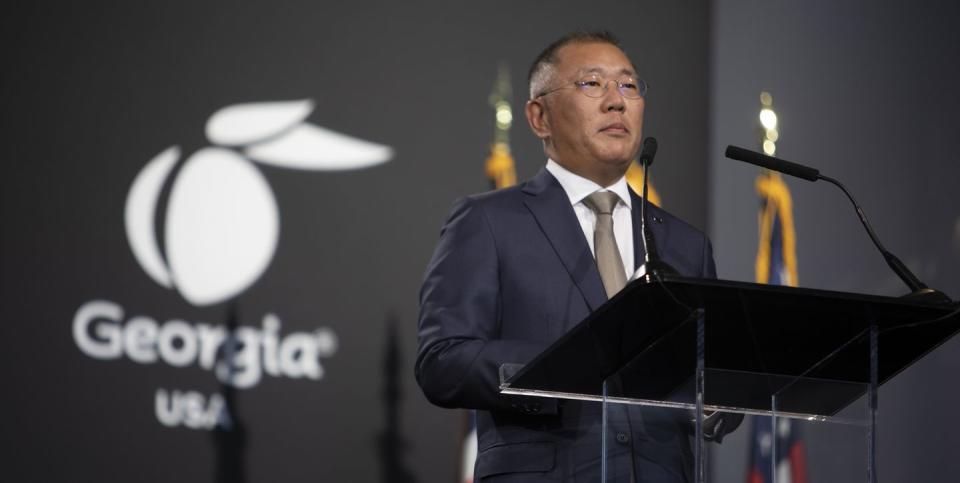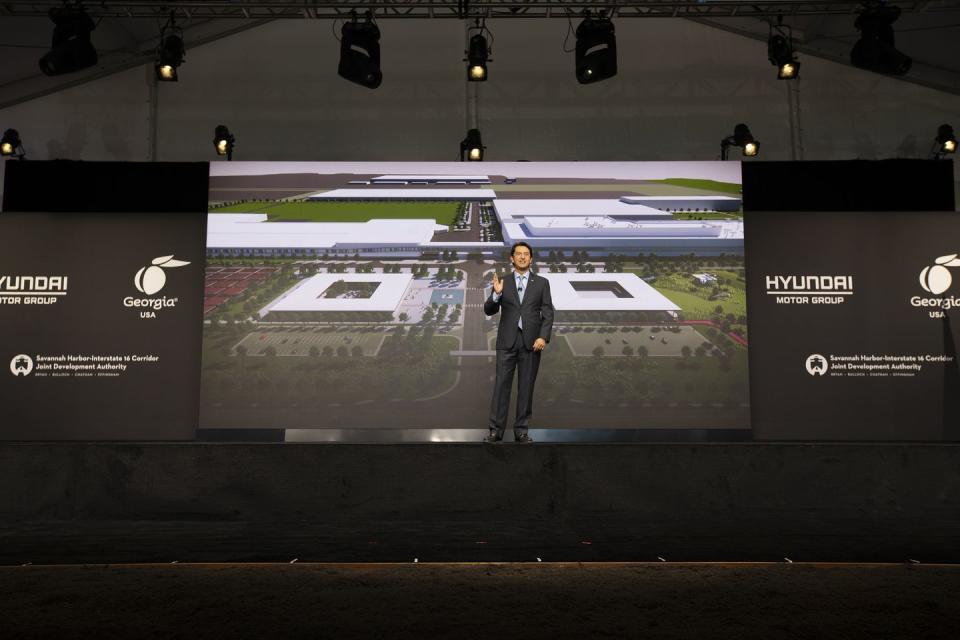Tax Incentive Controversy Overshadows Hyundai’s EV Plant Dedication in Georgia

President Biden’s Inflation Reduction Act was signed into law in August—three months after Hyundai announced plans for its EV Metaplant in Georgia.
Federal tax incentives will be withheld from automakers if critical minerals used in EV batteries do not come from North America or US allies by 2024.
In the short term, Hyundai executives say a simple solution would be a transition period until the joint venture company is established for battery production.
Hyundai Motor Group’s plan for an electrified future got a jolt of high energy this week as dozens of excavators converged on 2923 acres of vacant land west of Savannah, Georgia, for construction groundbreaking of a facility the automaker is calling a Metaplant that will produce batteries and the electric vehicles that rely on them.
Before production of up to six battery-electric models begins for the Hyundai, Kia, and Genesis brands, however, a contentious political issue must be settled at the federal level.
While hundreds of dignitaries gathered to celebrate Hyundai’s $5.5 billion investment in Georgia with ceremonial shovels full of dirt, the impact of President Biden’s Inflation Reduction Act (IRA) served as a tense backdrop as both the Korean ambassador to the US and the deputy US secretary of commerce mentioned the legislation in their scripted comments from the podium.
In its current form, the IRA will grant automakers federal tax incentives if 50% of critical minerals used in their EV batteries come from North America or US allies by 2024, rising to 80% by the end of 2026.
Automakers have said they cannot move that fast, and Hyundai executives have said none of their EVs would qualify for the credit, even though Hyundai Group brands now are number two in US EV sales, behind only Tesla.
Hyundai Motor North America CEO José Muñoz told journalists after the groundbreaking that the automaker supports the goals of the IRA as a way to eventually grow the EV market, but that the law needs to change. While vehicle assembly will start first (by early 2025), Muñoz said battery production would not be localized (in US, Mexico, or Canada) until 2026, which means the loss of federal tax incentives.

“The issue is, how do we handle the next two to three years, and the impact is severe,” Muñoz said, adding that Biden Administration officials have been “sympathetic. They understand that these have been unintended consequences of higher objectives that have been achieved by the administration.”
The controversy could jeopardize Hyundai’s plans in Georgia if the automaker does not qualify for federal tax breaks, Muñoz said. He and the Korean ambassador both recalled Biden visiting South Korea in May of this year, when Euisun Chung (pictured at top), executive chair of Hyundai Motor Group, announced the company's EV construction plans in Georgia.
The IRA had not been finalized yet but Biden made assurances during his Korean visit that the legislation would fit with the automaker’s goals. “He literally mentioned, ‘We won’t let you down,’” Muñoz recalled of Biden’s comments at the time. “And then just a few months later, we saw this and we were a little bit surprised.”
After the groundbreaking, the Korean ambassador, Tae-yong Cho, told journalists his office is exploring whether the IRA violates the free-trade agreement between Korea and the US, and that he hopes a solution is found quickly.
In the short term, Muñoz said a simple solution would be a transition period until the joint venture company is established for battery production, “because as a reminder, we announced all this before the law happened.”
Hyundai also has an economic development agreement with the state of Georgia requiring a certain number of employees (the company is talking about 8100 new hires) and phase-one production capacity of 300,000 vehicles (able to ramp up to 500,000 units). The automaker will face economic penalties if the goals are not achieved, Muñoz said.
Politics aside, Hyundai has been greeted warmly by Georgia—Kia opened its vehicle assembly plant in West Point 270 miles to the west of Savannah in 2009. Governor Brian Kemp highlighted the extensive investments in Georgia in the past two years in the area of electric mobility, including a new SK Battery plant. “The future of mobility will be made right here,” Kemp said at the podium.
While EVs are drawing all the attention, the South Korean automaker continues talking up the future of hydrogen-powered fuel-cell powertrains as part of the overall mobility solution.
Muñoz also told journalists that BEVs alone cannot satisfy personal transportation needs in many parts of the world.
“We are still investing a lot of resources of the company in the fuel cell,” Muñoz said. “So fundamentally we believe, for passenger cars and for commuting, battery EV is a good technology. But for a longer range and longer durability… the fuel-cell EV may be a better solution. So we keep working on those.”

Automakers globally are pushing hard to surpass 300 miles of range on a single charge, which Muñoz sees as the critical target for achieving widespread consumer acceptance of EVs. And until the US market reaches the tipping point of EVs outselling internal-combustion vehicles, Muñoz said it’s important for Hyundai to continue offering a wide range of hybrids and plug-in hybrids to help consumers make that transition to EVs.
The plant location is less than an hour’s drive to the deep-water port of Savannah (and three hours from Charleston, South Carolina), which opens the door to exporting EVs built at the new facility. But Muñoz said the focus for now is meeting demand in North America, particularly the US.
Share your thoughts on the Inflation Reduction Act situation with Hyundai and its Georgia Metaplant in the comments below.

 Yahoo Autos
Yahoo Autos 